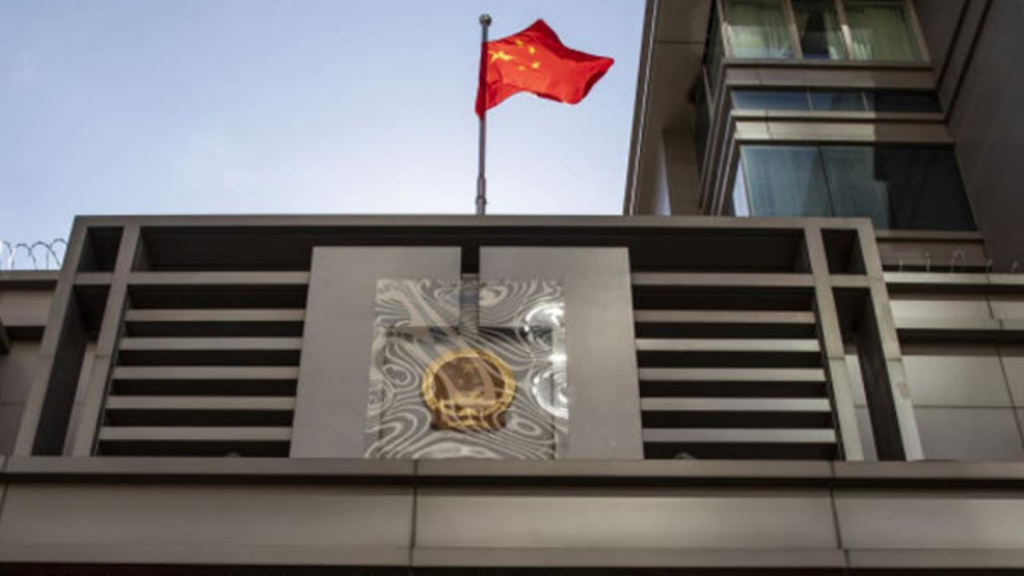CPA’s take: This is a very good quote from Attorney General Barr.
“The ultimate ambition of China’s rulers isn’t to trade with the United States. It is to raid the United States. If you are an American business leader, appeasing [China] may bring short-term rewards. But in the end, [China’s] goal is to replace you.”
US move comes amid stinging criticism of Beijing from leading figures in Trump administration
[James Kynge | July 22, 2020 | Financial Times]
The closure of China’s consulate in Houston, Texas, on US government orders is playing out like a scene from the dark days of the cold war.
Among the first inklings that the general public received of high drama unfolding was when a local TV station, KPRC 2, started broadcasting footage of fire engines standing with their lights flashing in the dark outside the consulate building.
A while later, the station published on its Twitter account a viewer’s video of fires raging in the courtyard of the consulate as staff scurried to incinerate papers in what appeared to be three separate oil drums.
Although the US issued no formal announcement ahead of its Houston consulate move, a steady stream of searing commentary on China from senior US officials in recent weeks provided a sense of what is motivating Washington.
“It’s remarkable that a local outlet in Houston broke the news after seeing fire trucks and smoke rising from the consulate,” said Jonathan Hillman, a senior fellow at the Center for Strategic and International Studies, a think-tank in Washington.
“But this follows a drumbeat of sharp public statements on China by [US secretary of state Mike] Pompeo, [director of the Federal Investigations Bureau Christopher] Wray and [attorney-general William] Barr,” he added.
Espionage, cyber snooping and intellectual property theft by China are common threads in those commentaries. Indeed, such concerns were subsequently reflected in the US state department’s statement that the consulate’s closure was ordered to “protect American intellectual property and Americans’ private information”.
The roots of US animosity over such issues run deep. Mr Wray said this month that the FBI opened a new China-related counter-intelligence case every 10 hours, with 2,500 cases under way.
He added that intellectual property theft by Chinese actors was “so massive that it represents one of the largest wealth transfers in human history”. Reports on the total cost of intellectual property theft by China in the US vary widely, but one estimate put the number at between $225bn and $600bn a year.
In the minds of some senior US officials, some of America’s largest corporations are also at fault for collaborating with Beijing in order to win access to China’s domestic market.
Mr Barr said this month: “The ultimate ambition of China’s rulers isn’t to trade with the United States. It is to raid the United States.
“If you are an American business leader, appeasing [China] may bring short-term rewards. But in the end, [China’s] goal is to replace you.”
US analysts said on Wednesday that the consulate decision may have been taken in response to Chinese actions that have yet to become public. They added that there had been a long history of allegations of intellectual property theft by Chinese actors.
Beijing has alleged that the US had in recent months repeatedly opened its diplomatic pouches, which are used to send items confidentially between overseas missions and home countries without customs inspections. It said the US had also seized China’s official work items.
It was possible, analysts said, that the US move was related at least in some degree to the US Department of Justice’s indictment this week charging two Chinese hackers with targeting American companies conducting coronavirus research.
The consulate closure is likely to plunge bilateral relations — which are already at their lowest point since the 1970s — to a new nadir. China reacted with outrage, in particular at the fact that consulate staff were given just 72 hours to pack up and leave.
Wang Wenbin, a spokesman for China’s foreign ministry, said the decision “in a limited time is an unprecedented escalation”.
“It seriously violates international law and basic norms of international relations,” added Mr Wang, according to Chinese state media.
Read the original article here.













